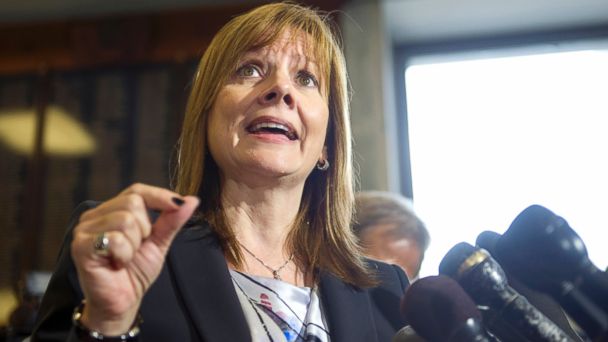Recalls Don't Slow GM Sales
Morning Money Memo…

General Motors CEO Mary Barra speaks during a news conference on Capitol Hill in Washington, June 18, 2014. Cliff Owen/AP Photo
General Motors CEO Mary Barra faced a rough ride at a House hearing over the company's slow response to flawed ignition switches. Members of Congress want to know why it took years for America's largest automaker to recall defective cars. But the months-long controversy has failed to put a dent in sales. "Consumer demand for GM products has remained quite strong," says Alec Gutierrez, senior analyst for Kelley Blue Book. "GM saw sales grow by more than 12 percent year-over-year in the month of May alone, outpacing growth in overall industry sales. Consumers have demonstrated that recalls do not factor as heavily into their purchase decision process, as we in the industry might seem to think," says Gutierrez. But the company's problems are far from over, with many unanswered questions.
Now Chrysler is facing scrutiny from federal regulators. The National Highway Traffic Safety Administration has opened two investigations into about 700,000 Chrysler minivans and SUVs as part of a widening inquiry into air bag and ignition switch problems across the auto industry. NHTSA wants to see if the keys can fall out of the run position under "harsh roadway conditions." Chrysler recalled 2010 models of the same vehicles due to the problem, but did not recall those from earlier model years. NHTSA said 23 drivers complained about the switches, but it had no reports of crashes or injuries.
Your morning commute to work is getting more expensive because of the fighting in Iraq. According to the AAA's unscientific survey of gas stations the national average of $3.67 is the highest price for this time of year since 2008. Other surveys have similar findings. "You are going to pay a little more than we thought you were going to pay," says Tom Kloza, chief oil analyst at the Oil Price Information Service and GasBuddy.com. "But you are not going to see any apocalyptic numbers. Gasoline prices typically fall in the weeks following Memorial Day, after supplies increase. This year, drivers are paying more.
Investors liked what they heard from the Federal Reserve: Another record high close for the S&P 500. The Dow closed up 98 points and futures are up slightly this morning. The Fed spoke of an improving job market and only modest inflation, saying there was no need to raise short-term interest rates anytime soon.
The Men's Wearhouse fight to own its one-time rival Jos. A. Bank is now complete. Today's announcement ends a series of dueling bids, first from Jos. A. Bank to buy Men's Wearhouse, and then vice versa. The final price tag to combine the two retailers was $1.8 billion. Industry watchers say that intense competition in the retail space made the tie-up inevitable. The new company will have about 1,700 stores and $3.5 billion in annual sales.
E-cigarettes may be less of a health threat than traditional smoking. But some doctors and politicians are worried that makers are trying to hook youngsters with fruity fun sounding flavors. Cherry crush is one of many examples. Senate Commerce Committee Chairman Jay Rockefeller tells e-cigarette makers that the last thing anyone should want to do is encourage young people to start using a new nicotine delivery product. The presidents of two companies, blu eCigs and NJoy, insist that they don't target young people and that their products are a critical alternative for people desperate to quit traditional cigarettes.
Richard Davies Business Correspondent ABC News Radio abcnews.com Twitter: daviesnow